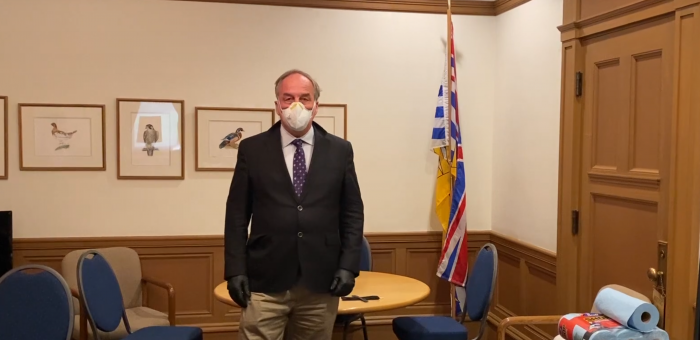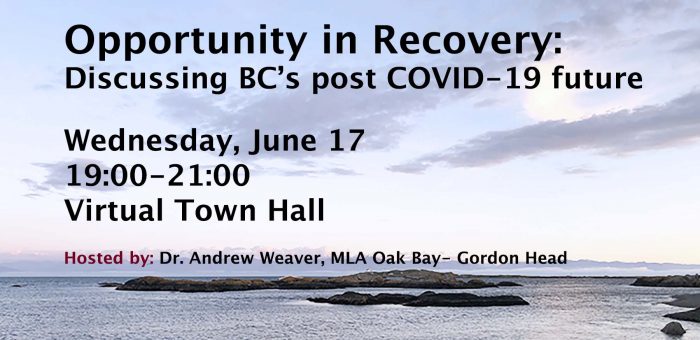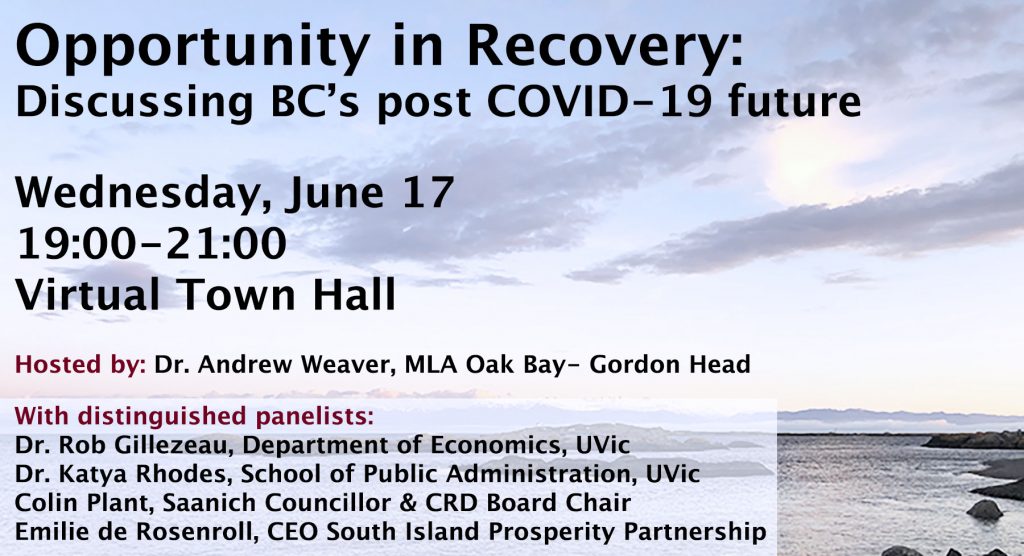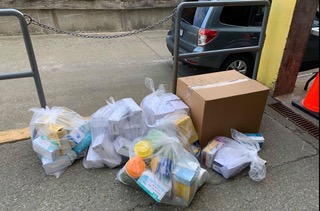Health
On the use of face masks to mitigate the spread of COVID-19
Today in the Legislature I rose during Members’ Statements to speak for two minutes about the scientific literature clearly demonstrating the efficacy of using face masks to stop the spread of COVID-19.
Following that I asked the Minister of Health if his government has any intention to implement a law or public health order making masks mandatory in all indoor and crowded spaces, outside of people’s homes, and if not, why not? I further asked the Minister if government does so choose to take this public mandate to require masks, how do they plan to implement and enforce said rules in the province of British Columbia?
Below I reproduce the video and text of both my Members’ Statement and Question Period exchange.
To demonstrate how easy it is to make a mask that has the potential to stop >95% of aerosol born virus transmission, I shot a quick video with how-to instructions below.
Video of Statement
Video of Question Period Exchange
Text of Statement
A. Weaver: I rise today to speak about some of the evidence concerning the efficacy of face masks as a mechanism to reduce the spread of COVID-19. Since the start of the COVID-19 pandemic, numerous studies have been conducted on the subject, and from this research, considerable evidence has emerged that mandating the use of masks in all indoor and crowded spaces outside people’s homes is a low-cost, high-reward measure that policy-makers could and should be pursuing.
To begin with, even though it is difficult to prove causation, we know that almost every nation that has seen widespread usage of face masks has fared better at limiting the spread of COVID-19 than those that haven’t. In many ways, this shouldn’t be surprising. Research conducted well before the current pandemic began — published in 2009 by Ben Cowling and others in the Annals of Internal Medicine — found that the combination of masks and hand hygiene significantly helped reduced the spread of influenza within households.
More recently a March 2020 study, published in the Journal of Medical Virology, showed that homemade masks made of simple four-layer kitchen paper and one layer of cloth can stop the transmission of more than 95 percent of the virus contained within aerosols.
Research directed by Cristopher Leffler from Virginia Commonwealth University — which is, admittedly, still undergoing peer review — has found that “social norms and government policies supporting the wearing of masks by the public as well as international travel controls are independently associated with lower per capita mortality from COVID-19.”
A comprehensive modelling study led by researchers at the University of Cambridge, in the U.K., published in the prestigious Proceedings of the Royal Society A, in June, concluded masks help to dramatically slow the transmission of the virus.
When taken together, mounting evidence is accumulating that the universal use of face masks is one of the most effective tools we have at our disposal to prevent the spread of novel coronavirus. While we await the holy grail of COVID-19 vaccine, it appears that making masks mandatory in all indoor and crowded spaces outside people’s homes can only aid British Columbia’s ongoing pandemic response.
To quote from the summary of the Proceedings of the Royal Society article: “My mask protects you. Your mask protects me.”
Question
A. Weaver: Well, thank you, hon. Speaker. I must say I’ve been here seven years, almost eight years, and this has set a new record. We’ve just finished three questions, and there are only four minutes left in question period. I’m not so sure this is the way this place is suppose to function, and I’m a little disappointed in my colleagues for taking that up and shoving me to the last couple of minutes of question period here. It’s unfortunate. The answers were not targeted, and the questions were rambling, in my view.
Anyway, as more and more evidence about the role that masks can play in reducing the spread of COVID-19 has emerged, growing numbers of jurisdictions have adopted laws making face masks mandatory in all scenarios where it will be difficult for people to remain physically distant. Just last week France introduced measures mandating masks in all enclosed public spaces. Across the pond, the U.K. began implementing a law that makes masks mandatory in grocery stores, shopping malls, post offices, banks and other busy establishments. Here in Canada, Quebec has made masks mandatory in indoor public spaces, while Toronto has established similar rules. And masks will be mandatory in indoor spaces in Nova Scotia, starting this Friday.
A recent poll from Angus Reid has found that there is broad provincial support for rules that would make masks mandatory in public spaces, with over 70 percent of British Columbians in favour of the changes. And although not all members of the public would be able to adhere to these rules, due to underlying physical or mental health conditions, the vast majority of the public would be able to follow them with relatively few personal costs.
My question is to the Minister of Health. Given the evidence in favour of universal wearing of masks and the broad public support for such a measure, will this government implement a law or public health order that makes masks mandatory in all indoor and crowded spaces, outside of people’s homes, and if not, why not?
Answer
Hon. A. Dix: I want to start by expressing my appreciation to the member for Oak Bay–Gordon Head for his consistent and thoughtful support for public health measures during this pandemic. It is much appreciated, and I thank him for his questions. He will know that Dr. Henry has answered this specific question a number of times in the past few weeks. Let’s see how I do, hon. Speaker.
You’ll know that, in July, we understand right now quite a bit about community transmission of COVID-19. That’s why we’ve taken specific public health measures — for example, public health measures to deal with houseboats, to deal with temporary accommodations, to deal with rental accommodations and resorts, to deal indeed with bars and with nightclubs and even with strip joints, and specific steps to deal with what is a significant issue in the agricultural industry.
Dr. Henry doesn’t believe, and I don’t believe at this time, that community transmission in B.C. justifies a mandatory mask mandate — not at this time. We think that it would not be justified in light of the significant challenges in both putting it into place and the very significant exemptions, which I know the member would understand, that would be required to do so.
He also knows — I know we have a little bit of time, he and I, for these questions, so I’ll just give him a little bit more information — that masks are, well, very important in terms of the hierarchy of measures we can take. It’s less effective than physical distancing and barriers and administrative measures. That said, Dr. Henry recommends, and I recommend, wearing a non-medical mask in circumstances where physical distancing cannot be maintained. I wear a mask in stores. I wear a mask in grocery stores. I wear a mask on public transit. I think, in these times, in particular in these times, wearing a mask is a reflection of good COVID sense but also a reflection of community respect. Many businesses, in fact, which have small spaces, are mandating masks within their businesses, within their COVID-19 plan.
I want to assure the member that this is our view for the moment, that we consistently have adapted based on the evidence, and we will continue to do so. The efforts of Dr. Henry, of public health, of the government and, indeed, of all the people of B.C. will continue to be founded on evidence and on science, and I know he appreciates that fact.
Supplementary Question
A. Weaver: I do note that the member opposite said my question was one minute and 30 seconds long. I just will say that, indeed, it was, and that we should have been able to have 20 such questions in this period, but we’re not getting to it.
I’d like to thank the minister for his response. I do appreciate government’s reservations about imposing a law that would make masks compulsory, and government should be commended for the job done so far in limiting the spread of COVID-19. But lurking in the background of discussions about masks and COVID-19 are concerns around the potential for government overreach. I understand that there’s a slow pace. However, we’re sitting in a once-in-a-century pandemic. Measures will need to be taken that will temporarily restrict some of our normal freedoms in order to preserve our collective safety.
One study, for example, that I referred to earlier in statements today, shows that even with a 50 percent efficiency, instead of a 95 percent type efficiency of most masks, you still get a lower R-rate number than you would without wearing masks. Since enforcing regulations around mandatory masks is frankly impossible for any government to handle by itself, many jurisdictions have appealed to the private sector to help with these rules, like in Quebec, for example, where periodic inspections happen in place, and in instances where individuals or businesses are caught, authorities have typically been empowered to apply fines.
My question is once more to the Minister of Health. If the government does so choose to take this public mandate to require masks, how do they plan to implement and enforce said rules in the province of British Columbia?
Answer
Hon. A. Dix: As noted, and this is the strong view of public health, with Dr. Henry, and it’s my strong view, at the moment, a mandatory mandate for masks is not required, is not desirable in British Columbia for some of the reasons that we have discussed at length and I’m happy to continue to discuss, because I think it’s an issue of public interest and debate. I applaud people who take the steps, because I think it’s an act of respect to wear non-medical masks, especially in areas where physical distancing can’t be maintained. That is of vital importance, and it is part of our collective response to COVID-19.
What we’re going to continue to do in B.C. is follow the science and follow the evidence in our pandemic. Yes, what happens in Quebec and what happens in France and what happens in Alberta is important, but one of the reasons we have been successful in B.C. is a determination also to follow our own B.C. course to deal with our own B.C. pandemic. That led to our response and our single-site order in long-term care. It led to our action, different from other jurisdictions, in dealing with temporary foreign workers in agriculture. I think these sorts of steps, which demonstrate a commitment to public health and to breaking the chains of transmission have been what have made us successful.
But I want to say this. I appreciate the comments of the hon. member, and I want to take this opportunity to thank all of the members of the House, as people have consistently made positive suggestions, been supportive.
This has been our response, our collective response to the COVID-19 pandemic, and it has been successful so far, I think, with extraordinary challenges and with some considerable losses. But we need to continue to do this together. There are weeks and months and maybe years to come. That will require generosity and positive spirit
Draft Segment 014
response to the COVID-19 pandemic, and it has been successful so far, I think, with extraordinary challenges and with some considerable losses.
We need to continue to do this together. There are weeks and months and maybe years to come, and that will require generosity and positive spirit together to continue to do that. So I encourage people to make suggestions, to engage in public debate on these issues, but mostly to be respectful of one another and for all of us to take our responsibility, as the government is, as we as a Legislature are, in breaking the chains of transmission of COVID-19 in B.C.
Opportunity in Recovery: A Discussion of BC’s post COVID-19 future
On Wednesday June 17 we held a virtual town hall to discuss BC’s post COVID-19 future and answer any related questions. It was a very successful event and I grateful to the myriad participants for their thoughtful questions and comments. We’ve had a lot of requests for a copy of the video of the event and so I’ve reproduced it below for those interested.
I wish to offer sincere thanks to the panelists Katya Rhodes, Rob Gillezeau, Colin Plant, Emilie de Rosenroll and special guests Merran Smith and the Honourable George Heyman for their insightful contributions to the town hall.
Video of Panel Presentation
Opportunity in Recovery: Discussing BC’s post COVID-19 future
Join us on June 17 for a virtual town hall hosted by Dr. Andrew Weaver, MLA for Oak Bay-Gordon Head. Dr. Weaver will be joined by distinguished panellists Dr. Rob Gillezeau, Dr. Katya Rhodes, Colin Plant, and Emilie de Rosenroll to discuss BC’s post COVID-19 future and answer any related questions you may have.
Please confirm your attendance in advance by registering using the link below.
Register in advance for this webinar:
https://us02web.zoom.us/…/register/WN_QtJOU8iGRhKQT8a7kmr75Q
After registering, you will receive a confirmation email containing information about joining the webinar.
Panellist Bios:
Dr. Katya Rhodes is an Assistant Professor in the School of Public Administration and member of the Institute for Integrated Energy Systems at the University of Victoria. She investigates the topics of low-carbon economy transitions and climate policy design using survey tools, energy-economy models, media and content analysis. Prior to joining the academia, Dr. Rhodes worked in the British Columbia (BC) Climate Action Secretariat where she led greenhouse gas (GHG) emissions modelling and economic analyses for the provincial CleanBC plan.
Dr. Rob Gillezeau joined the Department of Economics at the start of 2016. Prior to joining the department, he served as the Chief Economist in the Office of the Leader of the Official Opposition in Ottawa. Dr. Gillezeau’s research applies causal methodology from labour economics to answer questions in modern American and Canadian economic history. His work has examined questions related to the interaction of the War on Poverty and the 1960s race riots, the growth of the North American trade union movement, and the role that the Transatlantic slave trade played in the development of ethnicity on the African continent.
In 2016, Emilie de Rosenroll became the inaugural CEO of the South Island Prosperity Partnership (SIPP). She spearheaded a number of economic development initiatives, including the regional Smart Cities strategy, involving over 50 organizations and including 15 local Governments. Drawing on her extensive governance and Public-Private expertise, the first phase of the strategy focuses on transportation and mobility followed by a focus on building common data platforms along with measurement of Mobility Wellbeing.
Colin Plant is a Saanich councillor where he serves as chair of the arts, culture and heritage committee and as chair of the of the Saanich LGBTQ sub-committee. He is also drama teacher at Claremont Secondary school and is chair of the Capital Regional District Board. Originally from Salmon Arm BC, Mr. Plant graduated from Stelly’s secondary in 1990 as the class valedictorian and has lived in Saanich for 15 years.
Island Medical Program students stepping up in response to COVID-19
Over 60 Island Medical Program students are participating as volunteers in a student-led initiative to serve the community in response to the COVID-19 pandemic. They are providing a number of key services in our community, including:
- Contactless grocery delivery to seniors
- Assisting GPs with wellness phone checks with vulnerable patients
- Helping an inner-city response team respond to support our homeless population
- Childcare and pet care for front line workers
- Collecting PPE donations for Island Health
- Volunteering with UVic’s 3D printing of face shields for front line workers
 Madelaine Beckett (Class of 2021) began working with Jesse Spooner and Amy Kim (Class of 2020) to coordinate the outpouring of requests from students for opportunities to get involved supporting the community. Their early work included childcare, pet care and running errands for front line healthcare workers. Thanks to their early efforts, the initiative quickly expanded as new ideas came on board. Max Moor-Smith (Class of 2020) joined to lead an initiative to collect personal protective equipment and support the 3D printing project at UVic.
Madelaine Beckett (Class of 2021) began working with Jesse Spooner and Amy Kim (Class of 2020) to coordinate the outpouring of requests from students for opportunities to get involved supporting the community. Their early work included childcare, pet care and running errands for front line healthcare workers. Thanks to their early efforts, the initiative quickly expanded as new ideas came on board. Max Moor-Smith (Class of 2020) joined to lead an initiative to collect personal protective equipment and support the 3D printing project at UVic.
 Emily Lerhe and Caroline Spaner (Class of 2022) are leading a project called Bag Half Full to provide grocery delivery to seniors. There are now about 20 volunteers doing the shopping and deliveries. This was modeled on a project started at the University of Alberta, which has now expanded to other campuses across Canada.
Emily Lerhe and Caroline Spaner (Class of 2022) are leading a project called Bag Half Full to provide grocery delivery to seniors. There are now about 20 volunteers doing the shopping and deliveries. This was modeled on a project started at the University of Alberta, which has now expanded to other campuses across Canada.
Madelaine Beckett and Jesse Spooner and two others from the Class of 2021 (Emma Woo and Rita Wakelin) have been working to provide administrative support to the Victoria Inner City COVID-19 Response Team, a physician led group working to address the dual crisis of homelessness and COVID-19. In addition to the administrative work, they have recruited volunteers for assembling donated cell phones with SIM cards and software to support healthcare outreach to this vulnerable community.
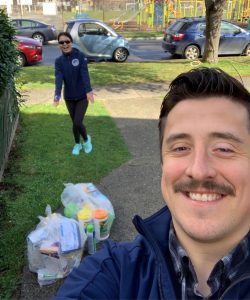 Other students have returned to work in their pre-medical school careers as paramedics and nurses. Many students are engaged in research projects dealing with COVID-19.
Other students have returned to work in their pre-medical school careers as paramedics and nurses. Many students are engaged in research projects dealing with COVID-19.
We are fortunate and grateful for the tremendous efforts of the Island Medical Program students. Thank you for stepping up so quickly to respond to the needs of the community. You have made a huge difference in the lives of so many people.
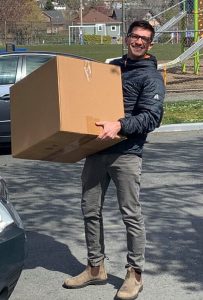 The Island Medical Program delivers the UBC MD program in collaboration with UVic and Island Health. Based on UVic campus and at affiliated healthcare centres across Vancouver Island, the program was created in 2004 to help address regional shortages of physicians, particularly in remote, rural and indigenous communities.
The Island Medical Program delivers the UBC MD program in collaboration with UVic and Island Health. Based on UVic campus and at affiliated healthcare centres across Vancouver Island, the program was created in 2004 to help address regional shortages of physicians, particularly in remote, rural and indigenous communities.
Both CHEK TV and the Oak Bay News have covered the remarkable, and selfless, contributions of these young medical-professionals-in-training.
On the gaps that exist in economic supports available to individuals & businesses during the COVID-19 pandemic
Without a doubt, British Columbia has led the way in North America in terms of introducing measures to curb the spread of the COVID-19 virus in our province. We are very fortunate that so many people are following the advice of Health Minister Adrian Dix and Provincial Health Officer Dr. Bonnie Henry. Thank you to all for staying the course during these difficult times.
Nevertheless, with Canada just over one month into a nationwide lock-down we are beginning to get a better idea of where the gaps are in the existing economic supports and where further relief is needed. Since many of the initial government interventions were broad in scope, needs specific to different industries have been left unaddressed by the existing programs. In BC, a BCC survey found that the current programs were of little use to one third of businesses, with nearly half of businesses with under five employees reporting that they do not find the existing programs to be helpful. Ongoing email exchanges and conversations with British Columbians have also revealed additional gaps in the existing programs. Some of these are highlighted below.
The Tourism Industry is Reeling
Unsurprisingly, sectors dependent on in-person interactions such as the hospitality and tourism industries have been among the hardest hit by the pandemic. For many businesses in the tourism industry, capital expenditures are typically made during the off-season and are offset by revenue generated throughout the summer months. However, the combination of social distancing measures, travel restrictions, and the closure of BC Parks and Natural Reserves has meant that tourism operators have been forced to grapple with hundreds of last-minute cancellations just as their busiest season was about to begin. With many businesses needing to service pre-existing debt loads, the loss of summer revenue has placed them in a precarious position. Exacerbating matters is the fact that many operators have had limited success in negotiations with travel insurance companies around the reimbursement of guests’ travel costs.
Currently, the economic supports introduced by the federal and provincial governments do not adequately address the scale and scope of the challenges that the industry faces, particularly given its seasonality. Assistance offered by the private sector such as deferring loan payments for three months are only stop-gap measures because payments will eventually come due. Additional solutions proposed to address the issues the tourism and hospitality industries are facing have included altering the terms of the existing loan programs to provide longer repayment periods, larger loan guarantees, and determining loan eligibility on a per property basis rather than a per owner basis.
Rent Assistance
One concern common to both individuals and businesses is the ability to pay rent. Even before the current economic crisis began, the high cost of living in urban areas was a pressing issue in federal and provincial politics. Rent prices have been increasing over the last decade and as of November 2019 the average rent in Vancouver was $2,507 per month. In Oak Bay, just under 20% of households fall below the affordability standard, defined as spending 30% or more of income on shelter costs.
Although Ottawa and Victoria have stepped in to provide the Canada Emergency Response Benefit (CERB) and the BC Temporary Rental Supplement Program (BC-TRS) respectively, many individuals have indicated that the existing supports will not be enough to get them through the crisis, particularly given the fact that relief from other recurring expenses such as mortgage payments, property taxes, utility bills, and debt payments are only temporary. If people are unable to make rent payments, hundreds of tenants could be facing eviction when the crisis is over. The impact of missed rental payments would also be acutely felt by landlords, many of whom are reliant upon rental income to make mortgage payments or to support their retirement.
On a commercial level, almost 60 percent of Canadian small businesses have said that they will be unable to pay rent come May 1st. The situation is particularly urgent in the food service industry where three quarters of respondents to a Restaurant Canada survey reported that that rent was a primary source of business debt.
Solutions floated to the issues facing renters and landlords have included increasing the provincial rent supplement, and federal government intervention to support renters by topping up the CERB payment. The recently announced Canada Emergency Rent Assistance program should provide much needed relief to small businesses but will need to be closely monitored to determine if it is ambitious enough. Many small business owners have expressed their reluctance to take on more debt and may require further support in the weeks ahead.
Ongoing Restrictions to the Canada Emergency Wage Subsidy
While making the criteria for the Canada Emergency Wage Subsidy more flexible has helped more businesses qualify for the program, many firms have indicated that they are still slipping through the cracks. Currently, only one third of businesses in BC are confident that they will qualify for wage subsidy, with 28% of businesses reporting that their revenue has not declined enough to meet the eligibility requirements. This issue is particularly pressing for businesses that have experienced revenue declines but are still trying to stay open to provide services to customers. Without additional support many of these businesses will be forced to close and layoff their employees, making an eventual economic recovery all the more difficult.
Unaffordable Childcare Costs
Both the province and the federal government have taken steps to ensure that essential service workers are able to access child-care throughout the pandemic. At the federal level, the CERB has been extended to those forced to care for their children at home and the Canada Child Care Benefit has been increased by $300 per child. In BC, the provincial government has prioritized spaces in child-care centres for essential service workers and has provided access to child-care services for school aged children through schools themselves. Yet despite these measures, essential service employees with children above the age of five are still struggling to find affordable child-care services. In some school districts, schools no longer have the capacity to offer child-care, forcing parents unable to work from home to resort to private options. For many households, the costs of private child-care are too high to remain a viable long-term solution to the lack of in-school supports.
Throughout the pandemic, essential service employees have been deservingly lauded as heroes for their selfless commitment to others. With some of these workers still struggling to find affordable child-care for their children, Ottawa and Victoria need to address the gaps in the existing support network so that workers in essential industries can continue to provide the services that British Columbians count on. If further support does not come soon, essential services workers may be forced to quit their jobs to care for their children at home.
Possible options here could include extending childcare services to out of district students if there are enough spaces available, distributing additional tax credits to families, or making the criteria for the CERB more flexible to cover a portion of the costs of childcare for essential service workers.
Supporting Individuals and Businesses
At the moment, there is a narrow window of opportunity for governments to act to aid struggling sectors and individuals. Many businesses are dangerously close to being forced to permanently close and cannot wait much longer for further assistance. Going forward, the government might focus on ensuring that as many individuals and businesses as possible can access their programs. Given the consequences of not doing enough, I am of the view that it is is better to do too much than to do too little.

